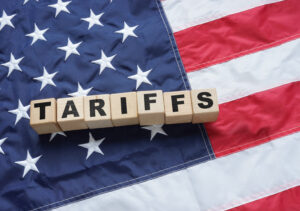Tariffs are simply a tax on imported products and services. When I speak with clients doing business overseas, or when I teach an International Business Law course, we always talk about tariffs. But until very recently, we never spent so much time on them. Tariffs were a “fact of life,” but companies dealt with them. Now however, discussion of tariffs (and the economy in general) seems to center around talk of “uncertainty” and “volatility.” The current U.S. Administration is threatening (and imposing) significantly higher tariffs than any of us can remember. If you’re an American company doing business globally, here are some things to know about Trump tariffs.
The “why” behind Trump tariffs
Companies trying to stay ahead of tariff news may be experiencing a bit of whiplash. Even though the “how” and “how much” might change, what hasn’t changed is the “why” behind them. The rationale behind Trump tariffs includes the following:
- Protecting domestic U.S. industry and bringing manufacturing back from offshore;

- Raising revenue for the Treasury (and whatever that might mean for U.S. tax reform);
- Positioning the U.S. to pursue domestic and international political goals; and
- Punishing nations and governments who are not seen as cooperative.
How the world is responding to Trump tariffs
At least some foreign governments have or will impose retaliatory tariffs on U.S. products. Whatever your political views, recognize that U.S. businesses need to cope with rapid and significant changes to their basic cost structures, and this isn’t the first time this has been a topic of discussion under President Trump. If U.S. companies are not able to source raw materials or component parts from countries that have not been hit with increased U.S. tariffs, then they will have few options other than to absorb the cost (and possibly pass it along to their buyers/customers). Finding alternate sources can take time and distract companies from other important initiatives.
How to prepare for Trump tariffs
From the perspective of an international business attorney, there are some proactive steps that we can recommend. Tariff rates generally depend on three basic factors:
- Value
- Classification of the Goods; and
- Country of Origin
You should re-check to be sure that each of these is correctly handled for your shipments. And simply because goods are shipped from China (for example) does not mean that China is the proper Country of Origin. Buying from new vendors in lower tariff rate countries is always an option, and now it is more critical than ever.
Also, you should examine whether your imported goods are properly classified and determine if tariff rates on individual components are lower than on finished goods. You may be able to save money this way (but, of course, final assembly would still need to be done here). Additionally, utilizing a Foreign Trade Zone is an option for some companies to manage tariff payments.
Lastly, review your contracts. Bringing manufacturing back to the U.S. is a worthy goal, but that also takes time and money, both of which are at a premium. In the short term, your company needs to be mindful of its contracts with vendors and customers. Look at your INCOTERMS, Terms & Conditions, and other contract documents to understand who is responsible for paying duties and other costs. Talk to your attorney about questions like these. Does your current contract give you the ability to impose a surcharge on your customers when unexpected cost increases arise? Is the imposition of increased tariffs tantamount to force majeure, which might allow you to renegotiate contract terms?
Our International Business and Trade Law attorneys are ready to counsel our clients and work with them through these challenging times and questions about Trump tariffs.









